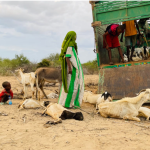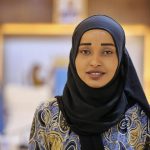Mogadishu (SONNA) – The African Union Mission in Somalia (AMISOM), in collaboration with the Southwest State Ministry of Women, Human Rights and Development, today organized an online training for Somali women leaders to enhance their participation in the political and decision-making process of their country.
The seminar titled Ensuring Women Political Representation in the COVID-19 Context, organised by the Protection, Human Rights and Gender (PHRG) Unit of AMISOM at the request of the South West State of Somalia, was attended by 25 women, and 10 men in different support capacities.
The Special Representative of the Chairperson of the African Union Commission (SRCC) for Somalia, Ambassador Francisco Madeira officially opened the one-day online seminar and reiterated AMISOM’s commitment to the promotion of Somali women in politics.
“Despite the challenges posed by the COVID-19 pandemic, we, at AMISOM, remain committed to promoting women’s rights and women’s political representation in Somalia, hence, the development of online programmes of this nature, which allow us to provide insights on gender, women’s rights and other key issues,” said Ambassador Madeira while opening the training virtually from the AMISOM Mission Headquarters in Mogadishu.
The panellists of the seminar were drawn from diverse backgrounds, including guest speakers from the senate, parliament, government ministries, and civil society organisations.
Ambassador Madeira commended Ms. Amina Mohamed Mursal, the Advisor to the President of Southwest State, for initiating the training, saying it was timely since Somalia is currently deliberating on upcoming elections, given the central role women play in national development.
“If we must build the Africa we want, it would be impossible to achieve if we fail to draw on the unique contributions that women make through their participation in politics and development,” said Madeira who is also the Head of Mission.
Ms Mane Ahmed, AMISOM Gender Officer, explained that such trainings are critical to build the capacity of female political aspirants in understanding the barriers to gender equality; Analysing the socio-economic context including the gaps and discussing ways and opportunities to address them.
Some key topics covered in the training included the importance of female leadership in Somalia, how to bridge the skills gap among women in Somalia, the impact of COVID-19 on women political participation, and initiatives to overcome COVID-19 limitations and increase civic voter awareness.
Other topics included existing legislations and policies protecting women rights to political representation, strategies can employ to overcome socio-economic barriers and power structures, and the role of NGOs in empowering women’s voice.
Participants at the seminar also engaged in vigorous discussions on number of issues affecting women, such as factors hindering the participation of female Somali youth in politics, the cultural and structural changes to ensure inclusive participation of youth and women in politics, and how technological tools can be harnessed to address existing issues and raise awareness, among others.
To underscore the challenges facing women in political participation, Khadija Mohamed Diriye, the Minister for Youth and Sports in the Federal Government of Somalia (FGS), reaffirmed the government’s commitment to enhancing the political participation of women but noted that there is need for an enabling law in place to guarantee women representation.
“It is important to amend the Provisional Constitution of the Federal Republic of Somalia to clearly stipulate the women’s Quota,” Minister Khadija said.
Ambassador Madeira noted that despite the challenge’s women in Somalia face in political representation and higher decision-making positions, which is also the case across the continent, Somalia was moving in the right direction.
“Somalia is already making some great strides in advancing women’s representation. The quality of guest speakers and facilitators here today attests to the fact that women are valuable partners in the democratization process, and the women of Somalia are also taking their rightful place in leadership positions at various levels, especially the top decision-making levels like the senate and parliament,” said Ambassador Madeira.
Following the COVID-19 restrictions discouraging public meetings, AMISOM’s Protection, Human Rights and Gender Unit has been holding a series of online trainings and the women’s leadership training is so far the first to target Somali women.
Madeira advised the participants to take advantage of the knowledge dispensed by the professionals in AMISOMs Protection, Human Rights and Gender Unit, so as to embark on a journey of women empowerment and for them to make the most out of the training.





